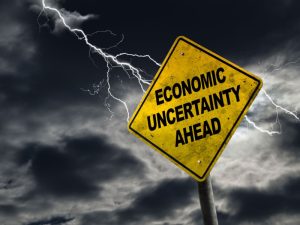Cristian deRitis Speaker Biography
Deputy Chief Economist at Moody’s Analytics, Certified Risk Management Professional, Certified Business Economist®
Cristian deRitis is the deputy chief economist at Moody’s Analytics where he specializes in the analysis of current and future economic conditions, housing markets, and consumer credit. He publishes his analysis regularly on the Economic View website and is often quoted in publications such as The Wall Street Journal for his views on the economy. Economist speaker Cris deRitis is a certified risk management professional and writes a monthly column on risk management issues for the Global Association of Risk Professionals. Before joining Moody’s Analytics, Cris worked for Fannie Mae where he developed default, prepayment, and loss severity models for mortgage portfolios. He holds a PhD in economics from Johns Hopkins University and is a certified business economist. In addition to his published research, Cris is named on two U.S. patents for credit modeling techniques.
Cristian deRitis Speaking Topics
Climate Risk Stress Testing and the Role of Central Banks
Proponents and detractors have already weighed in on the Federal Reserve’s news climate scenario analysis exercise, which is designed to help banks assess the physical and transition risks of climate change. How, exactly, will the Fed’s exercise work, and should central banks play a part in projecting the impact of these risks – not only for individual banks but for the financial system as a whole?
Housing’s Next Act
• Home price growth during the pandemic has been extraordinary in terms of its magnitude and depth. • A sharp correction in prices would have negative consequences for property owners and the broader economy. • New data on valuations and speculative activity allow us to identify markets that are at a higher risk of correction. Home prices increased during the pandemic as ultra-low mortgage rates stoked demand. Now that rates are rapidly reversing course, homeowners and regulators are rightfully concerned that prices could sharply decline, triggering a wave of foreclosures and higher unemployment. In this session, we will summarize the factors supporting home values as well as the risks to prices in the short term. Using newly developed databases to better measure valuations and speculative activity within local housing markets, we will identify areas with higher and lower likelihoods of experiencing a home price decline within the next few years. We conclude the session with a summary of the Moody’s Analytics home price forecast under the baseline and alternative scenarios.
Risk and Resiliency in the U.S. Economy
• Persistent inflation is the primary concern of consumers, businesses and policymakers. • The pandemic shock has been replaced by energy and food price shocks caused by Russia’s invasion of Ukraine. • Businesses face a number of challenges affecting both demand and their input costs. Just as it looked like the U.S. economy was moving beyond the pandemic recession, Russia’s invasion of Ukraine has further scrambled supply chains and propelled inflation rates even higher. In this session, deRitis summarizes the factors driving inflation to its highest level in more than forty years and the actions that the Federal Reserve will take to bring prices down. We highlight other potential risks to the economy and review the Moody’s Analytics economic baseline and alternative scenarios. We conclude the session with a summary of the actions business leaders and risk managers can take now to navigate through future volatility.
5 Risk Predictions for 2024
In the coming year, we can expect a slowdown in worldwide economies, an increased emphasis on operational resilience, a shift toward simpler and more flexible models, a stronger demand for qualified risk professionals, and new risks and opportunities fueled by shifting demographics.






